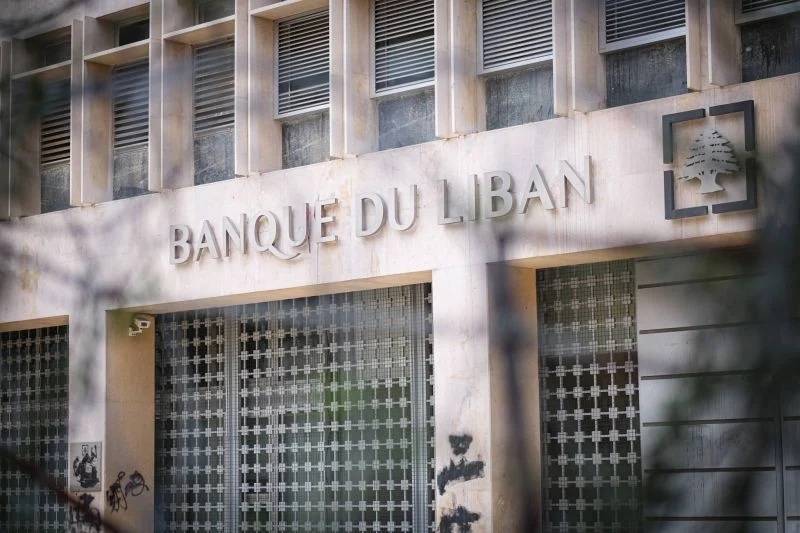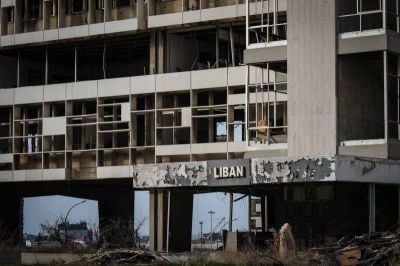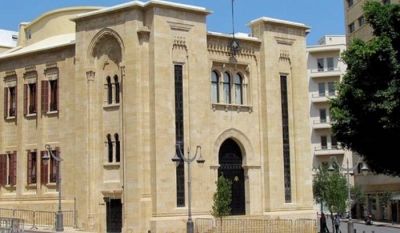
The Banque du Liban headquarters in Beirut. (Credit: João Sousa/L'Orient Today)
This article is part one of a two-part series on how Lebanon’s new taxation system is set to deepen existing inequalities. Read part two here.
BEIRUT — Lebanon’s newly imposed tax rates on wages and salaries are unfair to lira earners, according to the International Monetary Fund (IMF).
The Minister of Finance issued a decision in January to tax US dollar salaries and wages at the LL15,000-to-dollar exchange rate, far below their value on the parallel market that dictates the pricing of most goods and services.
In other words, for USD earners, only a fraction of their purchasing power is taxed. Meanwhile, lira earners pay taxes on the full value of their salaries and wages.
The income tax brackets used in Lebanon’s 2022 budget — which, against the recommendation of the IMF and outside experts, were not indexed to inflation — have tripled.
While many perceive the new tax rates as a tax hike, given the gap between the real value of dollars and their taxable value because of the exchange rate used, effective taxes on dollar earners are still below their pre-crisis levels.
On the other hand, they are the highest they have been in the past three years, during which time dollars were valued at a fraction of their actual worth, using the LL1,507.5 rate. Amid inflation, most Lebanese find their purchasing power lower than ever before.
The budget’s retroactive taxation — which applies the new rates to the start of 2022, 10.5 months before the budget was even passed — was also a significant blow to many workers.
Unfair taxes
Imagine two hypothetical taxpayers: Farah is a public elementary school principal with an income of LL7 million per month, in line with real-life principals today. Abdo is a graphic designer with an income of $1,000 per month. For simplicity, both are unmarried and have no dependents.
Farah’s LL7 million, equal to $87.77 on Monday morning’s parallel market, incurs a tax of LL128,750 (1.8 percent).
That same amount, $87.77, had it been received in fresh USD, would be taxed at the LL15,000 rate, becoming LL1.32 million in the eyes of the tax authorities. Since LL1.32 million falls within the standard deduction, no taxes are due on that amount. In fact, a single dollar earner does not get taxed until they reach $208.33 in monthly income, at which point a lira earner is already paying over LL1 million.
Abdo's salary of $1,000 will be taxed as though the salary was LL15 million, paying LL863,750 monthly. In the eyes of the tax system, those LL863,750 represent a 5.76 percent tax rate on his gross income. But those tax payments presently carry an exchange value of just $10.83, making the practical average tax rate on $1,000 — which can be exchanged for LL79.75 million — just 1.08 percent, lower than Farah’s, in percentage terms.
The decision to value dollars below their real market value was lambasted by the IMF in a report authored last November but released in January. The Lebanese government is in protracted negotiations in order to secure a bailout from the Fund.
“The exchange rate for valuing taxes is not meant to (and should not) be a tax policy choice or set at some ad hoc preset value. Adopting a lower rate than the [central bank’s] Sayrafa or any preset value in absolute amount for tax purposes is strongly recommended against,” the IMF report said.
The report went on to say the “mis-valuation” of dollars had “regressive consequences” impacting horizontal equity— the principle that people with the same income should pay the same taxes. “The exchange rate for valuing taxes is not meant to, and should not be, a tax policy choice or set at some ad hoc preset value,” the report added.
“There is now a severe differential tax treatment favoring those who are paid salaries in US dollars over those who are paid in LBP, as the same real amount would effectively be subjected to two different tax rates,” the IMF stated.
It noted that some salaries must remain in lira, for instance, those in the public sector, while others have the right to earn dollars.
Before and after the crisis
Because tax brackets were tripled while inflation has run rampant, some taxpayers may find themselves in a higher marginal tax bracket than before. This is known as bracket creep — when inflation pushes people into higher tax brackets, which are usually fixed at a particular number, without an increase in real income. But the situation is different for lira and dollar earners.
Pre-crisis, if Abdo was already earning $1,000, after a standard deduction for a single taxpayer with no dependents is applied, he would have paid a tax of LL25,300 per month. That is a top marginal tax rate — the highest bracket for which the taxpayer qualifies — of four percent and an average tax rate of 1.68 percent.
Today, Abdo’s $1,000, after a standard deduction for a single taxpayer with no dependents, incurs a tax of LL863,750. Because the tax brackets have not grown as much as inflation, his LL15 million of declared income is subjected to a much higher top marginal tax rate of 11 percent, and a higher average tax rate of 5.76 percent. But because his dollars really represent LL79.75 million, not LL15 million, his actual tax rate of 1.08 percent, is far lower than his pre-crisis rate of 3.83 percent.
“Essentially what we’ve done over the past three years — and continue to do so now, because the real value of the dollar is still very much away from the value that is being used in the taxation system — is that we are subsidizing individuals who have high net worth, who have high capital, who have higher propensity to consume,” said Economist Sami Zoughaib of Lebanese think tank The Policy Initiative.
“What is happening is that we are subsidizing these people through currency manipulation, through manipulating the price and artificially setting prices for the currency that do not reflect the real market.”
The case for lira earners is more complicated because while the lira has depreciated, many lira salaries have been increased to some degree.
Three years ago, someone in Farah’s position was earning around LL2.26 million and paying LL67,038 in monthly taxes. Their top marginal tax rate was seven percent and their average tax rate was 2.96 percent.
Farah’s income has tripled in lira terms, but the lira has lost more than 98 percent of its value, making her present income worth 94 percent less than her pre-crisis income. Simultaneously, her average tax rate has decreased because the standard deduction amount has increased, shielding some of her income from taxation.
Some lira earners, namely those whose lira salaries have increased a larger amount to offset depreciation, may see a real tax increase. For instance, if someone’s salary went from LL1.5 million to LL20 million, losing 75 percent of their income in dollar terms, their taxes increased from the lira equivalent of $16.78 to the lira equivalent to $18.67.
“They consider that today, among those who earn in lira, no one is earning amounts like LL50-60 million,” Hassan Wehbe, a tax official in the Ministry of Finance, said about internal discussions on the decision.
“The highest salaries in lira reach around LL20 million. They consider that if they wanted to impose the same implementation on those who earn dollars, they will have high taxes, so they made this gradation. But from the point of view of tax fairness, yes there’s no fairness. If you want to compare the two… of course there’s no fairness, the one who earns $1,000 pays less taxes.”
The IMF argued in its November report that “a single market exchange rate should be used for all valuations for tax purposes.” On a short-term, transitional basis, the Fund said “an index that is reasonably close, and converging, to the market exchange rate can be used.”
Some players in Lebanon’s economy argued that the IMF’s report did not take into account the complex dynamics at play in Lebanon’s crisis. Exchange rate unification may not be feasible without other simultaneous measures to address the frozen banking system, they argue.
“Definitely the aim of the IMF and any reform that should happen in Lebanon the first requirement is to unify the tax rate,” said a tax accountant at a major international tax advisory firm. They requested anonymity as they were not authorized by the company to speak to the media.
“But the issue we’re really living with is how do you want to let people pay more tax if they have their money trapped at the banks. So you can’t have a half solution… and that’s why no one is taking the decision or is willing to take the bullet by saying let us do that [unify the exchange rate]. They want to give a solution that is holistic, and that is what we’re lacking currently,” the accountant added.
Amid Lebanon’s collapsing economy and paralyzed government, state revenue collection has hit historic lows that place the country near the bottom of the global range of revenue collection.
The World Bank estimates that in 2022 state revenue reached a low of five percent of GDP, far below the rate that the body says is needed to “make a state viable and put it on a path to growth.”
The cash-strapped state is unable to provide the basic infrastructure and utilities needed for an economic recovery, while institutions that are vital for public wellbeing (not to mention developing the “human capital” for a robust economy) are at risk of collapse.
These include 29 public hospitals, 279 primary healthcare centers, more than 1,200 public schools educating 30 percent of the nation’s children, the sole national university, electricity and water grids, internet infrastructure and more.
The International Monetary Fund (IMF) has called reversing the decline in revenue a “critical element” of the reforms needed for Lebanon to make its way out of the crisis.


